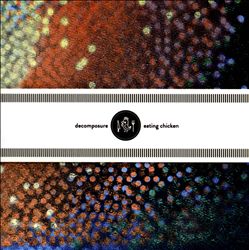Artist: Decomposure
Album: Eating Chicken
On average, Decomposure‘s Eating Chicken will probably appeal most to fans of at least one of
* Ben Folds’s solo career
* The Beach Boys’ Pet Sounds / Smile era
* Abstract, avant-hip-hop, such as is purveyed by Doseone, El-P, or Aesop Rock.
 I say “on average” and “probably” because Caleb Mueller (who is Decomposure, when he’s not earning a living as a graphic designer) is not the same person as Folds, Brian Wilson, Doseone, etc. As a writer he’s both more personal, like a good blogger, and more political than any of them. As a singer, his pleasantly reedy and geeky voice reminds me of Folds, but is less theatrical, not putting on a front, although he is willing to refine his voice into a flexible tool: unguarded here, stacked and counterpointed there, low and cold and percussively firm elsewhere. My prediction is also uncertain because sometimes we like a recipe significantly more or less than we like the ingredients individually. Or if not, the non-existence of Chipotle Cheeseburger Ice Cream — or yeast-eating contests — is an enormous market failure.
I say “on average” and “probably” because Caleb Mueller (who is Decomposure, when he’s not earning a living as a graphic designer) is not the same person as Folds, Brian Wilson, Doseone, etc. As a writer he’s both more personal, like a good blogger, and more political than any of them. As a singer, his pleasantly reedy and geeky voice reminds me of Folds, but is less theatrical, not putting on a front, although he is willing to refine his voice into a flexible tool: unguarded here, stacked and counterpointed there, low and cold and percussively firm elsewhere. My prediction is also uncertain because sometimes we like a recipe significantly more or less than we like the ingredients individually. Or if not, the non-existence of Chipotle Cheeseburger Ice Cream — or yeast-eating contests — is an enormous market failure.
The singles from Eating Chicken are among the most style-blended songs here. Oh Brother is plainly sung over plinky New Wave toy synthesizer until joined by mass harmony and tambourine. The titular brother has joined those who recite in daily life from Fox News and its misinforming anger-by-numbers, a fate that’s befallen parents and uncles and cousins of my various friends. Like my friends, Mueller alternates between love and frustrated attacks on what he hears when “Somebody reaches through your guts to work your mouth”. The falsetto he breaks out for “You’re so vain, you’d never know this song is about you” is delightful; the humble plainness of “Pot and kettle, I know I’m just the same/ I’m supposed to love you, but sometimes I’d rather punch you in the face” is more in character.
Readymade is peppy but trickier. It’s Afro-pop in its precise non-aligned percussion layers and call-and-response vocals (and many of its intonations), but with Beach Boys lushness and a willingness to march the arrangements into a wall while finishing a lyric. These lyrics, like on Decomposure‘s rap-heavy 2007 masterpiece Vertical Lines A, work on a more implicit level. Some juxtapose allusive images and warped cliches: “Readymade on a paper plate (food for thought is a good trade)/ Where neutral is a smiley face (or your face will freeze that way)”. Others extend a metaphor in poetic but self-subverting directions: “I cut out my heart, inflating it with my last breath/ … It floats into the night, climbing soft, growing a padded halo named color/ … [beating back] knife-blade clouds storing black snow/ slow-rising under a phantom bridge/ pumping ‘Please let me cry, I need to cry, just let me cry’, but instead it sneezes and dies/ and at the end of a block, a truck hits it”. Others literalize a metaphor into a failed inspirational greeting card: “Outside, my naked hopes grew cold/ So I kept them warm at home/ And went to work to buy them clothes”. All but the last sung cheerily.
Readymade excepted, Mueller saves his dense lyrical associations for his raps. We hear would-be Vertical Lines B in three songs: Black Snow, much of which is pretty synth-and-harmony pop, but some of which he raps ultra-fast into a Vocorder, and all of which clatters along amid whirling robot tap-dancers. Safety Scissors, funky but spooky like Prince fronting the Borg Collective (Now A Time Warner Subsidiary) and no longer promising us all sex in exchange for being absorbed. And Island, an African sing-along at a factory where the boss radios instructions in a clipped voice. The maze-like lyrics of each are worth reading along to.
Most of Eating Chicken is gentler, more vulnerable. Breaking Up is unsteady vocals over rudimentary acoustic guitar, choosing the nostalgia over the literal sense of “I just saw it for the awesome graphics, wanted to see things explode/ watch some giants stomp through traffic, wave the flag like  a burning skunk/ and all the characters talked with each other the way toys did when I was small”. Waiting, equally unsteady over simple piano and echoed percussion, is about three imminent deaths, maintaining the same sad but half-jaunty tone for the end of life of a murder victim, a beloved cancer-ridden husband, and a fallen squirrel. Selah, fragile flute/ piano/ tapping as willfully adorable as any Owl City song, is sung to his baby. “You’ll reach out and grab my finger, though I know that’s just a reflex thing/ You wake up every few hours, and your tired mom gives you milk and sings” ground the song enough to make the love more than generic, until goofy but precise vocal harmonies lift the song skyward.
a burning skunk/ and all the characters talked with each other the way toys did when I was small”. Waiting, equally unsteady over simple piano and echoed percussion, is about three imminent deaths, maintaining the same sad but half-jaunty tone for the end of life of a murder victim, a beloved cancer-ridden husband, and a fallen squirrel. Selah, fragile flute/ piano/ tapping as willfully adorable as any Owl City song, is sung to his baby. “You’ll reach out and grab my finger, though I know that’s just a reflex thing/ You wake up every few hours, and your tired mom gives you milk and sings” ground the song enough to make the love more than generic, until goofy but precise vocal harmonies lift the song skyward.
We Shall Be Overcome, in implacable polyphony and body-slapping rhythm, is the anthem of defeat its title implies: “They will shut us up, they will have their way/ Our bodies ragdolls dumped in unmarked graves/ They’re free to roll ahead once we’re brushed aside”. Its desultory cheerfulness reminds me of me: fighting the good fight to the degree that sanity allows, remembering that part of what we’re fighting for — even if it saps us of useful fanaticism — is the freedom not to frown about tasks ahead all the time.
Maybe that’s a real thing; maybe not, I dunno. The 7:24 a Test, employing every style found on Eating Chicken, is about Mueller being offered $10,000 to use his music in an ad campaign. He’s self-effacingly sarcastic about why he didn’t like the idea: “Selling sweatshop sweaters/ seemed antithetical to my precious integrity”. But “Feist counted as Apple’s Chinese workers died” isn’t a joke; Mueller’s songs have always had things to communicate, and they were often nearly the opposite of “let’s go shopping!” A Test is one of the most intimate songs I’ve ever heard, because — having stated heroic goals he doesn’t expect us to understand anyway — he fails them by okaying the ad.
But as he himself sings on Wide Awake, “What if the apocalypse never comes/ and we have to keep living with all that we’ve done?”. Because he has a wife and a child and musical ideas and, still, those inconvenient morals and beliefs, he does so. Living is what we do. It’s mostly a sweet deal — dead people never get to play catch with 4-year-olds using imaginary balls, or gaze in awe at daredevil squirrels, and they only get to dance during painful-looking rituals in bad zombie movies — so we try to get better at it. Meanwhile, we give it a soundtrack. Ideally, we infuse it as much as possible with our own meanings. And put the commercials on mute.
– Brian Block
To see the rest of our favorites, visit our Favorite Albums of 2012 page!
